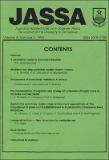| dc.description.abstract | Great progress has been made in meeting food needs during the last 30 years as a result of the 'green revolution'. However, because of the scope for expanding cultivated areas was limited, yield increases were the major source of food production growth in all developing regions except Africa, contributing about SO per cent of increased cereal production in developing countries as a whole. According to the United Nations, the current world population of 5.5 billion will double to 10 billion by 2050. About 97 per cent of this increase is projected to occur in the Third World (Anon, 1994). Thus, over the next 50 years, farmers and policy makers in developing countries will be challenged to provide food at affordable prices for about 100 million more people every year. Moreover, the increase in food production will have to come from further intensification of the existing cultivated land since expansion of cultivated land is no longer feasible (Oudejans, 1991). At present, with the intensification of agriculture and widespread use of high-yielding varieties, chemical pesticides have been increasingly used to protect crops from pests. However, their use has been challenged because of economic, environmental, and social concerns. Considerable evidence now shows that routine application of some pesticides, particularly insecticides, is both unnecessary and undesirable, and can create pest outbreaks, upset natural ecology, pollute the environment, and harm the health of both farmers and consumers. | en |


